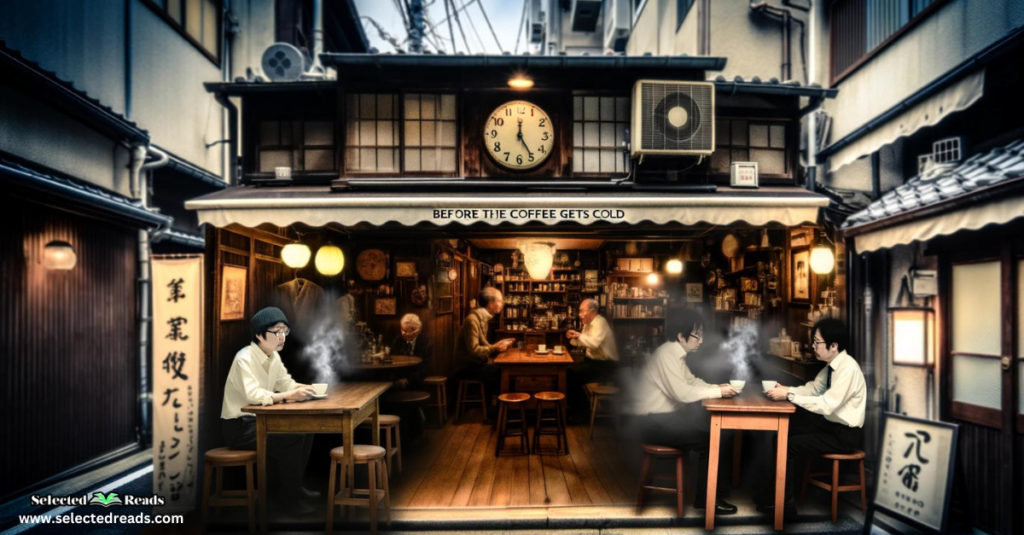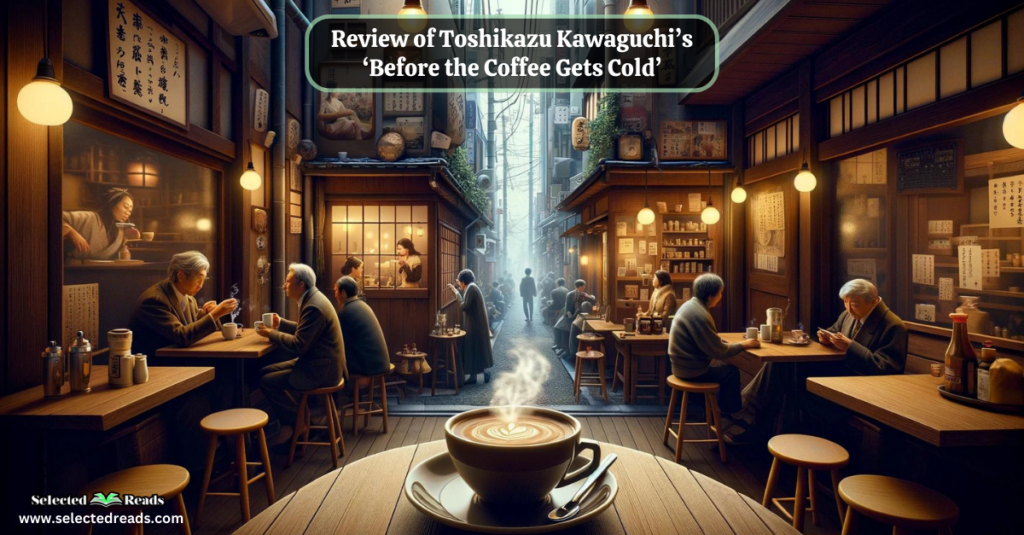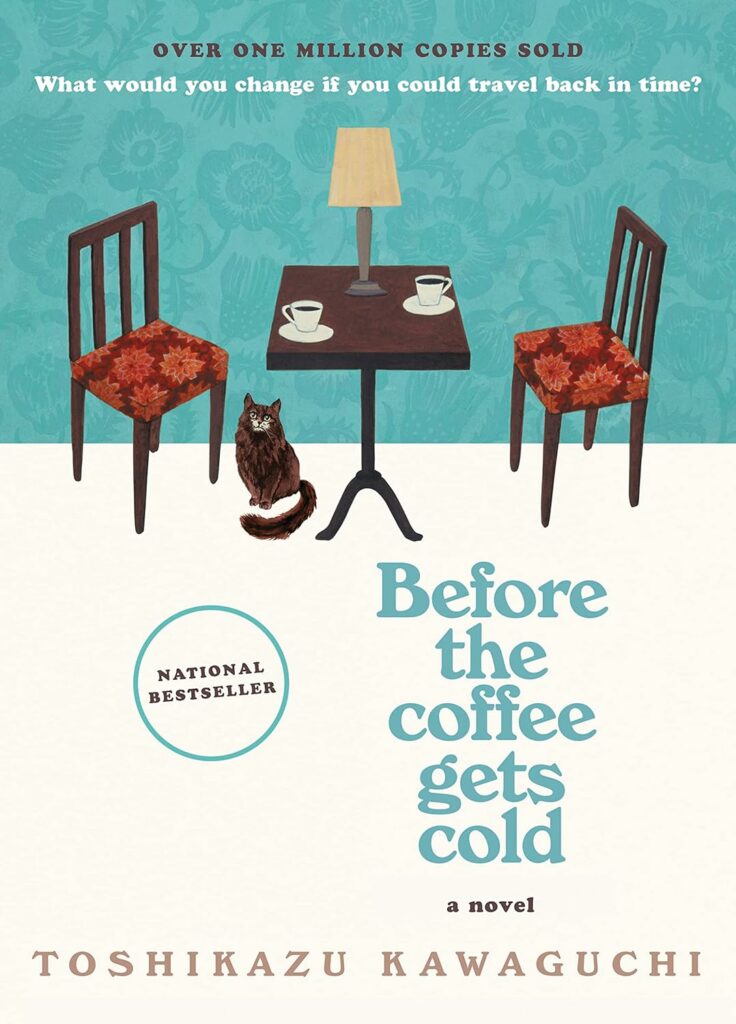In today’s post, I am introducing you to one of my favourite literary fiction reads, Diving into of ‘s Before the Coffee Gets Cold by Toshikazu Kawaguchi. The novel takes you on amazing journey into a heartwarming and time-bending universe where you get to experience and explore life’s intricate tapestry, woven with threads of regret, hope, and the timeless quest for understanding.
Our review of this work will proceed as follows: First, I provide an extended summary of the novel, then talk about its genre characters, and conclude with a set of thought-provoking book club questions designed to deepen your reading experience.
Related: Before the Coffee Gets Cold Quotes
Before the Coffee Gets Cold Summary
Toshikazu Kawaguchi’s ‘Before the Coffee Gets Cold‘ is one of those reads that sticks with you long after you’ve turned the last page. Set against the backdrop of a quaint Tokyo café, the novel unfolds a narrative that’s as comforting as it is bittersweet. This café, hidden in a back alley and brewing its craft for over a century, holds a secret: it offers its patrons the extraordinary opportunity to travel back in time. Yet, as enticing as this proposition sounds, it comes with its own set of rules, the most poignant being that the time-travel journey must end before the coffee cools.
Kawaguchi weaves together the stories of four distinct customers, each drawn to the café with the hope of revisiting a moment from their past. Through these interconnected narratives, the novel explores themes of regret, reconciliation, and the complex nature of human relationships. The time travel element serves as a unique vehicle for the characters to confront their past choices, unresolved conflicts, and unspoken feelings.
The first rule of the café’s time travel is as metaphorical as it is literal: you cannot stay in the past beyond the time it takes for coffee to cool down. This limitation reflects on the fleeting nature of time itself and the importance of acting in the moment. Another rule is that while you can see and interact with the past, you cannot change the present. This rule offers a poignant commentary on acceptance and the need to find peace with one’s past rather than trying to alter it.
Each of the four tales in the novel presents its own moral and emotional quandaries. From a woman who wants to confront her lover who left her, to a daughter wishing to receive a letter from her mother who could not finish writing it before passing away, the characters’ journeys are deeply personal yet universally relatable. They remind us of the intricate dance between holding on and letting go, and the courage it takes to face our own histories.
Photo: Amazon
Kawaguchi’s storytelling is gentle yet profound, blending the fantastical element of time travel with the mundane rituals of daily life, such as drinking coffee. The setting of the café, with its timeless ambiance and the ritualistic preparation of coffee, becomes a character in its own right, offering a space for reflection, transformation, and ultimately, closure.
Before the Coffee Gets Cold is not just a novel about time travel; it’s a meditation on the human condition, the power of connection, and the indelible marks that personal history leaves on us. It’s a reminder that while we cannot change the past, we can find meaning in it, and in doing so, perhaps find a way to move forward with a little more understanding and grace. The novel’s success, marked by its bestseller status and the resonance it has found with readers worldwide, speaks to the universal longing for second chances and the healing that can come from confronting our past.
In a way, Kawaguchi offers a cup of carefully brewed literary coffee that, much like the time-bound beverage in his story, invites readers to savor the moment before it’s gone. It’s a tale that encourages us to reflect on our own lives, relationships, and the fleeting nature of time itself.
What Genre is Before the Coffee Gets Cold?
Before the Coffee Gets Cold by Toshikazu Kawaguchi deftly blends multiple genres, creating a unique and compelling narrative experience. At its core, the novel is a fusion of fantasy, drama, and literary fiction, marked by the following genre characteristics:
- Fantasy: The novel’s central premise of time travel within the confines of a quaint café introduces a fantastical element that is pivotal to the plot. This aspect situates the story firmly within the fantasy genre, as it explores the magical possibility of revisiting the past over a cup of coffee.
- Drama: The deeply emotional and personal journeys of the characters, coupled with themes of love, regret, reconciliation, and the human condition, give the novel a dramatic flair. The interpersonal relationships and the characters’ internal struggles add to the dramatic tension and emotional depth of the story.
- Literary Fiction: The novel also possesses qualities of literary fiction, with its emphasis on character development, exploration of themes like the nature of time and the complexity of human emotions, and a narrative that invites reflection. The writing style, which balances accessibility with depth, and the focus on the human experience, further aligns it with literary fiction.
Before the Coffee Gets Cold Characters
In Before the Coffee Gets Cold, Toshikazu Kawaguchi introduces us to a cast of characters whose lives intertwine within the confines of the small, time-traveling Tokyo café. Each character brings their unique story and emotional journey to the café, seeking to reconcile with their past in the short window of time before their coffee gets cold.
Here’s a brief overview of some key characters and their roles in the narrative:
- Fumiko – She is one of the first customers we meet who wishes to use the café’s time-traveling offer. Fumiko wants to go back in time to see her boyfriend before their relationship fell apart, seeking closure and understanding about why things ended the way they did.
- Kohtake – A nurse who frequents the café, Kohtake desires to go back to a time when her husband still remembered her. This storyline touches on themes of love, memory, and the impact of Alzheimer’s disease on relationships.
- Hirai – She is a beautiful but troubled woman who wants to confront the man who left her, seeking answers and possibly a way to mend her broken heart. Her story explores themes of love, loss, and the quest for personal redemption.
- Kei – The younger sister of Nagare, the café’s manager. She has her own reasons for delving into the past, showcasing the depth of family bonds and the lengths to which we go to protect and understand those we love.
- Nagare Tokunaga – The manager of the café, who is also versed in the rules and intricacies of its time-traveling ability. He serves as a guide for the time-traveling patrons, offering them insight and sometimes cryptic advice as they navigate their journeys.
- Kazuo – The café’s owner, who, together with Nagare, helps maintain the café’s legacy and its secret. He is a quieter presence but is integral to the operation and maintenance of the café’s unique offering.
- Yasunari – A patron who is also a ghostwriter, he becomes involved in the stories of the time travelers, providing an outsider’s perspective on the events unfolding in the café.

Before the Coffee Gets Cold Book Club Questions
Here are some questions that can guide your book club’s conversation:
1. Exploring Themes:
- How does the novel explore the concept of time and its impact on human relationships? What do you think the author is trying to convey about the nature of time and regret?
- The café’s rules for time travel are quite strict, including that one cannot change the present. How do these rules affect the characters’ journeys and decisions? What might the author be suggesting about the possibility (or impossibility) of changing one’s fate?
2. Character Analysis:
- Which character’s story resonated with you the most, and why?
- Discuss the development of Fumiko’s character throughout her journey. How does her understanding of her relationship and herself change after her time travel experience?
- The café serves as a character in its own right within the story. How does the setting influence the events of the novel and the characters’ experiences?
3. Narrative Structure:
- The novel interweaves multiple stories within a single setting. How does this structure affect your reading experience and your understanding of the themes?
- Time travel in literature can often lead to complex narratives. How does Kawaguchi keep the story accessible and engaging despite the complexities of time travel?
4. Emotional Impact:
- Were there any moments in the book that particularly moved you? If so, which ones and why?
- Discuss how the limitation of the time travel (it can only last as long as the coffee stays hot) heightens the emotional stakes of the characters’ journeys. Does this time constraint make their decisions more poignant?
5. Themes of Connection and Regret:
- The novel deals heavily with themes of regret, missed opportunities, and the desire to reconnect. How do the characters’ stories reflect different aspects of these themes? Can you relate to any of their regrets or desires?
- How does the novel suggest that facing one’s past can impact one’s present and future? Do you agree with this perspective?
6. Philosophical and Ethical Questions:
- If you had the opportunity to visit the café and travel back in time, knowing the rules, would you? Why or why not?
- Discuss the ethical implications of time travel as presented in the novel. Is it a blessing or a curse for the characters who undertake it?
7. Cultural Context:
- The novel is set in Japan and has been translated into English. How do you think the cultural context influences the story? Are there any aspects of the story that you feel might have specific cultural significance?
8. Author’s Purpose:
- What do you think Toshikazu Kawaguchi was trying to achieve with this novel? Do you think he succeeded?
- How does the novel’s conclusion reflect on the overall message of the book? Were you satisfied with the ending?
Related: She Who Became The Sun Summary
Final thoughts
As we wrap up our journey through the world of Before the Coffee Gets Cold, it’s clear that Kawaguchi has crafted a narrative that resonates on multiple levels. The novel’s blend of genres offers a rich landscape for exploration, while its characters provide a mirror to our own lives and the choices that define us. The thought-provoking book club questions we’ve shared are just the beginning of what promises to be a rewarding discussion for any reader or group.
Whether you’re drawn in by the allure of time travel, the depth of human emotion, or the simple pleasure of a story well told, this novel offers a treasure trove of themes and moments to reflect upon. In the end, Before the Coffee Gets Cold invites us to ponder the profound question of what we would do if we had the chance to face our past, all while reminding us of the fleeting nature of time and the importance of living in the moment.




